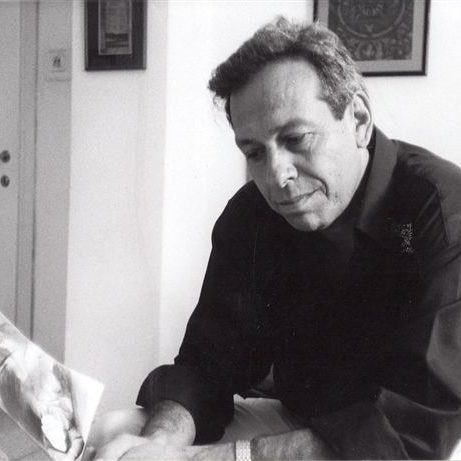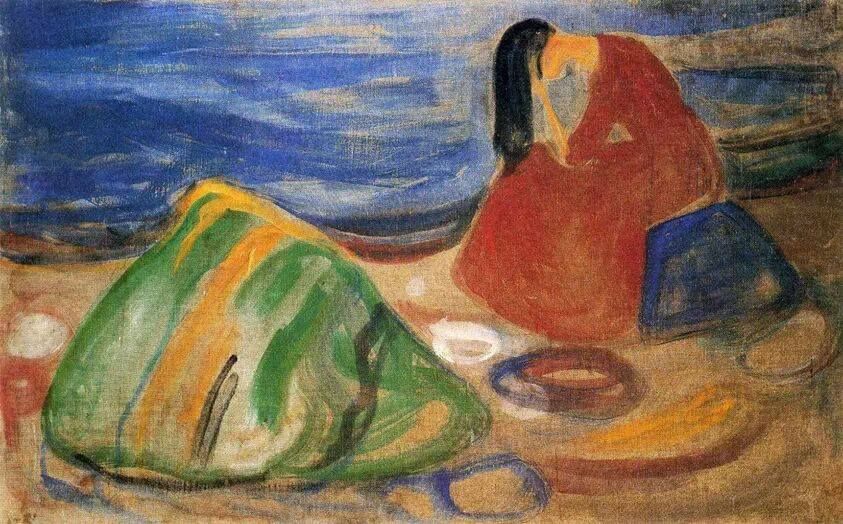When we deal with depression as a disease or a psychic state (It can be both), we talk about the loss of libido, libidinal decline, convergence, seclusion, detachment from life and the joy of life, from the feeling of life, from the warmth of life, and the sensing any pleasure – anhedonia. Utterly or inwardly, the person converges, disconnects, does not feel part of the world, is rejected even by God, is Self-hatred, guilty of failure, and does not feel the love, the pleasure of relationships, and the emotional connection to others.
The concept of eros includes life energy, emotional life, libido, and sexual energy. By the loss of libido, we also mean that there are Regions or areas in the Psyche, Zones that are dead.
Usually, the person feels alive when he is energetic, when he feels the impulse of life, and feels the joy of life and his sexuality and pleasure, he can sense his emotional contact with others, and sometimes as a substitute to those feelings (due to his severance from his emotions He may also have a kind of energy of a more spiritual nature, which connects him to the world in a less sexual erotic way and we will still call it life energy, but it may hide a kind of depression. This energy can be symbolized either through the world of down which we may call the underworld, the bottom of the earth or in the world of death, Airey, spiritual and can also connect the world of virtue to the heavenly world, the world of the sky which can also hide the disconnection the depression.
.Beyond the general picture of depression, be it a more normal depression or a pathological clinical depression, Jung made that kind of definition
With the usual symptoms of loss of energy, anhedonia, disturbing thoughts, negative thoughts, severe sleeping problems, etc. , everyone can be attacked by depression in a way that is characteristic and unique to himself and to his depression: Then, when he is depressed, what usually revived -him, made him Pseudo happy, compensate for his depression or the things in which he invested energy and received energy back, disappeared and is unable to reward him anymore.
Depression also raises the question of introversion and extroversion… Jung claims that the loss of energy in the ego consciousness goes down to the unconscious, and in extroversion loss of energy is clearer.
There are past causes of depression or having places in the psyche that are numb and severing without any feelings or an emotional connection.
There are present triggers of depression, and there are ways of coping with depression and trying to get along with it and overcome it, repress or deny it, or ignore it. Finding ways of hiding, denying, or compensating for postering or using others.
And alongside the causes and ways of coping, there is also the purpose-the prospective perspective of depression, what it was created for, not only the reasons but the purpose to correct something or work it through and then arise the question, what and why now? What is it supposed to bring, tand o what change does the mind have to adjust? Or what needs here to process emotionally and mentally that does not work, and the psyche has tried to deny it till now?
Usually, the person denied depression (especially in Men), ignored, avoided, ran away, threw and threw at others something he was going through. It can be transformed into anger, rage, nervousness, negativity, apathy, and indifference. But if he connects to his depression and lives it and tries to accept it then the person has not given an account of something that has happened or is happening to him. Because of this ignoring, the self, the wholeness of his soul, demands from him to pay attention, "it's time to pay the prices," he avoids. "
Oedipus-Rex the King, as a young bright man solving the riddle of the Sphinx about what a man is, is trying to solve the new mystery of midlife: why is his kingdom sick with an epidemic, what is the reason, what does not work correctly at his kingdom? What is the meaning of the plague? (Midlife crisis) What did not undergo healing was covered and must be discovered or what was only overcome or was denied. Or, for what past deeds or surviving mechanism did the soul not pay the price or work through?
There are the causes of depression in the past, even the early part of the person, or the factors and causes in the present, which are two different things, in the past, referring to unprocessed traumas, early losses, initial loneliness, different injuries or rejection from father, mother, or society, lack of love, lack of family. Need to Survive mechanism of placation, detachment, denial, and closing.
Survival of focusing and relying on intellect is the only antithesis of emotions.
There is also Intergenerational transmission of depression, traumas, or post-trauma of a parent's failures, holocaust, and strong complexes that the child absorbed unconsciously.
The children live their parents' life. With every anger, frustration, and failure of the parents, they take on themselves because, in childhood, the parent's fate is still the fate of the child, which is not separated yet. He lives the parent world as part of him and tries to heal them with his tools. And unfortunately, always fail.
On the other hand, the causes in the present can be a failure or loss of any kind, physical loss, psychic loss, a person's bereavement, widowhood, a stage of life ended, relationships ended, a project ended, disappointments, new adjustments, failure in parenting, or the loss of a child. Accumulated anger or protest that has not received expression, the humiliation that has been silenced, traumatic divorce. Failures or frustration at work. Severe health problems, Diseases, and loss of any capacity. Conflicts at work. Abusing of any kind.
Or with the boss, problems in the family, society, politics, and, of course, the process of old age, accompanied by losses of all kinds and the new adjustment and current fading until death. The thing is that when the person has no tools to react or to work- emotionally, he can unconsciously build a depression over time.
Therefore, the person's coping with depression can be in avoidance, escape and search for substitutes. Addictions of any kind: escape to drinking, gambling, food, sex, shopping and anything addictive can be possible.
In behavior towards others, coping with depression can be characterized by repercussions on others, anger that covers up depression, various escapes, and reparations such as sadomasochistic sexuality, mainly masochistic, never-ending compulsive prayer, the behavior of obstruction and self-destruction, mental payment and self-punishment for everything there is a kind of life and pleasure, development of bipolar mechanisms, development of extreme and chronic guilt feelings and various attempts at atonement.
Sometimes we will also see the use of others to draw and suck life energy, the use of the lover, spouse, or children. Or the establishment that is supposed to compensate for self-destruction, and self-sabotage, often also we see the behavior of self-neglect, lack of hygiene, and lack of concern for self-health.
What does depression come for, what does it signify, what does it want from the person, from the mind, from the spirit, or what does it have to do with the mental hygiene and development of the person? What is mental and emotional does not work correctly in the person, and what is necessary now for the person and especially for the psyche.
The questions sometimes arise about what has not been worked through, cured, and solved in the person's past, and maybe the time has come to get rid of it now, which is in the development backward. Or what needs to be done by the Psyche to develop forward for the future.
In mental development, we try to give the whole self a place as well… To the mental integrity that has from the mental immunization, the correction, the healing, and even the
transformation, while depression is a marker, it is a convergence; it is a certain possibility to exit from the process of life. To take time off, to do the process, to undergo processing, healing, or transformation that has reached its time. In Jung's concept, it is freeing the energy that has fallen into the unconscious. You have to pull it back by psychological work with the UC. It becomes important for the individuation process.
And, of course, it cannot always work as we want it.
The understanding that depression is a marker, that it is a signal, that the situation must be used to begin to recognize the inner mental contents to heal to go through a process is very significant in the Jungian sense of the word individuation: And there are differences here between personal tendencies.
The extrovert must connect to his introverted side – to the inner face and the introvert to his outer world, not to stick inside… The outside or inner world must not necessarily radicalize the natural tendencies to get along with the crisis- which often happens. The thinking type must connect to the emotion, his feelings, and process his psyche emotionally and get off coping only with the help of the thought, which usually brings him obsessive intrusive, disturbing thoughts as part of the depression. Whereas the too emotional one, the feeling type, who only copes with the emotional world and stops thinking, only gets into hysteria, panic and thinks to arrange everything only with the help of emotions, must start thinking and arranging things, understand and accept proportions. …
The sensory type must stop trying to compensate itself with the help of the senses: food, drink, a kind of taste and smell of
touch, etc., and make sure to start using intuition as the internal mental patterns. He came to a dead-end path only to work and compensated himself through the senses, not to understand life. And the intuitive who lives only on the symbolic and spiritual levels stops predicting bad news from his imagination. He must connect to the ground and absorb the depression in the context of real life and the people around him.
In depression, there is often a call for change, processing the past, and better connecting with ourselves.
דיכאון, אובדן ארוס וטרנספורמציה נפשית
במושג ארוס אנו כוללים אנרגיית חיים, לבידו ואנרגיה מינית. האדם מרגיש חי כאשר הוא אנרגטי, כאשר הוא מרגיש את דחף החיים, חש את שמחת החיים ואת המיניות שלו. יכולה גם להיות לו אמנם אנרגית חיים בעלת אופי רוחני יותר, המחברת אותו לעולם באופן פחות מיני ועדיין נקרא לכך גם אנרגיית חיים. אנרגיה זו יכולה להיות מסומלת או דרך העולם של מטה, תחתית האדמה, בעולם המוות ויכולה גם לחבר אותו לעולם של מעלה לעולם השמיימי.
כאשר אנו עוסקים בדיכאון אנו מדברים על אובדן ליבידו, על ירידה ליבידינלית על התכנסות, הסתגרות, על ניתוק מן החיים משמחת החיים, מתחושת החיים, מחמימות החיים ומהנאה מכל סוג שהיא. האדם מתכנס, מתנתק, לא חש את עצמו כחלק מהעולם ואינו מרגיש את האהבה את ההנאה ואת הקשר אל האחרים.
מעבר לתמונה הכללית של דיכאון, עם התסמינים המקובלים, את כל אחד יכול הדיכאון לתקוף בדרך אופיינית וייחודיות לו עצמו ובדיכאון שלו: מה שבדרך כלל החייה אותו, שימח אותו, הדבר שבו השקיע אנרגיה וקיבל בחזרה אנרגיה, נעלם ואינו מסוגל לתגמלו…
יש סיבות לדיכאון, יש גורמים לדיכאון ויש דרכי התמודדות עם הדיכאון וניסיונות להסתדר אתו ולהתגבר עליו, להדחיק או להכחיש אותו, להתעלם ממנו. ולצד הסיבות ודרכי ההתמודדות, יש גם את התכלית של הדיכאון, לשם מה נוצר הוא נוצר, על-מנת לתקן מה? , מה הוא אמור להביא, לאיזה שינוי הנפש מתכווננת? או מה צריך פה לעבד ריגשית ונפשית שלא עובד והנפש מתכחשת אליו. האדם התכחש, התעלם, נימנע, ברח, זרק והשליך על אחרים למשהו שעובר עליו. האדם לא נתן שום דין וחשבון על משהו שקרה או קורה לו והעצמי, הכוליות של הנפש תובע ממנו, לשים לב, "הגיע הזמן לשלם".
אדיפוס המלך אחרי שכצעיר פתר את חידת האדם, מנסה לפתור את התעלומה החדשה: למה ממלכתו חולה במגפה, מהי הסיבה, מה לא עובד נכון? , מה לא עבר ריפוי אלא רק התגברות או על מה הנפש לא שילמה את המחיר.
ישנם הגורמים לדיכאון בעבר של האדם או הסיבות והגורמים לכך בהווה, אילו שני דברים שונים, בעבר, הכוונה לטראומות לא מעובדות, לאובדניים מוקדמים, לבדידות ראשונית, לפגיעות שונות מאב, מאם או מהחברה, מחוסר אהבה, חסר משפחה. העברה בין דורית של דיכאון של טראומות, כישלונות, שואה וכן קומפלקסים חזקים של ההורה שהילד ספג אותם.
לעומת זאת, הסיבות בהווה יכולים להיות אובדן מכל סוג שהוא, קשרים מסתיימים, פרויקט מסתיים, כישלונות, אכזבות, למידות חדשות, כשלון בהורות אבדן של ילד. משברי תקופות, משברי גיל, משבר אמצע החיים, חשבונות נפש התפקחות כעס עצמי… כעסים מצטברים שלא קיבלו ביטוי, מחאה שהושתקה, גירושין. כישלונות או תסכול בעבודה. מחלות ואובדן כושר כלשהו. סכסוכים בעבודה או עם הבוס, בעיות במשפחה, בחברה, בפוליטיקה וכמובן, תהליך הזקנה המלווה באובדניים ובהתגלות חדשה ודעיכה עד המוות.
ההתמודדות של האדם עם הדיכאון אם כן, יכולה להיות הימנעות, בריחה וחיפוש תחליפים. התמכרויות, בריחה לשתייה, להימורים, לאוכל, למין, לקניות וכל דבר אפשרי.
בהתנהגות כלפי הזולת, ההתמודדות עם הדיכאון יכולה להתאפיין בהשלכות על האחרים, בכעסים שמכסים על דיכאון, בבריחות ופיצויים שונים כמו מיניות סדו-מזוכיסטית בעיקר מזוכיסטית, תפילה כפייתית בלתי נגמרת, התנהגות של הכשלה והרס עצמי, תשלום נפשי הענשה עצמית על כל מה שיש חיים ועונג, פיתוח של מנגנונים דו קוטביים, פיתוח של רגשות אשם קיצוניים וכרוניים וניסיונות כפרה שונים.
לעיתים נראה גם שימוש בזולת לשאיבת אנרגיית חיים, שימוש בבן או בת הזוג, בילדים בממסד האמור לפצות על ההרס עצמי, על חבלה עצמית, נראה לעיתים קרובות גם הזנחה עצמית, חוסר היגיינה וחוסר דאגה לבריאות עצמית.
לשם מה בא הדיכאון, מה הוא מסמן, מה הוא רוצה מן האדם, מן הנפש, מן הרוח או מה הוא קשור להיגיינה הנפשית ולהתפתחות של האדם? מה נפשית, ריגשית לא עובד נכון אצל האדם ומה נחוץ לו לאדם ובעיקר לנפשו.
עולה השאלה לעיתים, מה לא נרפא ונפתר בעבר של האדם והגיע זמנו להיפטר עכשיו, וזאת בהתפתחות לאחור, או מה צריך להיעשות על מנת להתפתח קדימה עבור העתיד.
בהתפתחות הנפשית אנו מנסים לתת גם לעצמי השלם מקום… לשלימות הנפשית שיש בה מן החיסוניות הנפשית, התיקון, הריפוי ואפילו הטרנספורמציה ואילו הדיכאון הוא סמן, הוא התכנסות, הוא יציאה מסוימת מהתהליך. על מנת לקחת פסק זמן, על מנת לעבד, על מנת לעבור עיבוד, ריפוי או טרנספורמציה שהגיעה זמנה.
ההבנה שדיכאון הוא סמן, שהוא מסמן שיש להשתמש במצב להתחיל להכיר בתכנים הנפשיים על מנת לרפא, על מנת לעבור תהליך ….
ויש פה הבדלים בין הנטיות האישיות:
האקסטרוברט חייב להתחבר לאינטרוברטיות שלו -לפנים והאינטרוברט לאקסטרוברטיות שלו…לעולם החיצון ועל שניהם לא דווקא להקצין את הנטיות הטבעיות על מנת להסתדר עם המשבר.
הטיפוס החושב חייב להתחבר לרגש ולעבד ריגשית ולרדת מהתמודדות שהיא רק בעזרת המחשבה, כזו שמביאה את המחשבות הטורדניות כחלק מהדיכאון. ואילו הריגשי מדי, שמתמודד רק עם העולם הריגשי ומפסיק לחשוב, רק ניכנס להיסטריה, לפניקה וחושב לסדר הכול רק בעזרת הרגשות חייב להתחיל לחשוב ולסדר את הדברים, להבין לקבל פרופורציות…
הטיפוס החושי חייב להפסיק לנסות לפצות את עצמו בעזרת החושים: אוכל, שתייה מין טעם ריח מגע וכו ולדאוג להתחיל להשתמש באינטואיציה בתבניות הנפשיות הפנימיות. הוא הגיע לדרך ללא מוצא רק לעבוד ולפצות את עצמו דרך החושים ולא להבין את החיים. והאינטואיטיבי שחי רק ברבדים הסימבוליים והרוחניים, חייב להתחבר לקרקע ולקלוט את הדיכאון בהקשר של החיים הממשיים
בדיכאון יש לעיתים קרובות קריאה לשינוי, לעיבוד העבר ולהתחברות טובה יותר לעצמינו.

.
ד

